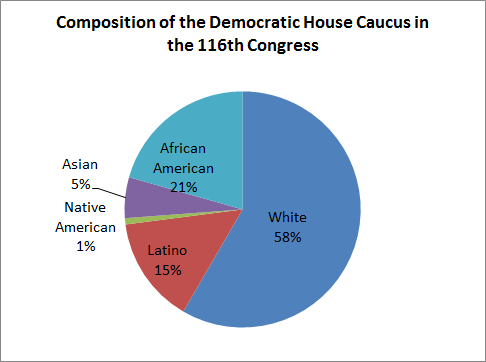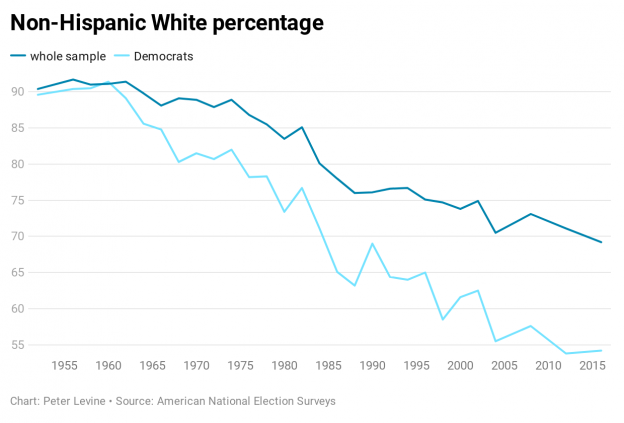- Facebook208
- Twitter1
- Total 209
Representative Eliot L. Engel, chairman of the House Foreign Affairs Committee, appears to have lost a primary to Jamaal Bowman, a middle school principal:
“Poverty is by political design, and it’s rooted in a system that has been fractured, and corrupt, and rotten from it’s from core from the inception of America.” @JamaalBowman #NY16 pic.twitter.com/cxWCPVTptu
— People for Bernie (@People4Bernie) June 24, 2020
This is part of a significant trend: relatively conservative incumbent Democrats in relatively safe Democratic states and districts are falling to more progressive newcomers, such as Alexandria Ocasio-Cortez (N.Y.-14), Ayanna Pressley (Mass.-07), and Marie Newman (IL-3). These insurgents are more diverse and younger than the incumbents. To be sure, a majority of progressive primary challengers have lost, but the net shift is toward a larger bloc within the Democratic caucus.
We should now see assertive progressive caucuses grow in the US House and in many city councils and state legislatures–mirror-images of the House Freedom Caucus on the right. They should and will help to maintain and expand Democratic Party control of as many legislative chambers as possible, while acting as the sharp, leading edge of Democratic majorities. (Jamelle Bouie made this argument in the New York Times.)
The country is becoming more diverse, and people of color tilt heavily toward the Democratic Party. As a result, the Democrats are about to cease being a white-majority party, although many of their national leaders still are white, especially in the Senate.
In 2016, half of the voting delegates at the Democratic National Convention were people of color. These delegates were not appointed as a gesture to symbolic representation or diversity. They were elected by their own power bases. When a party that elects these delegates wins national elections, white dominance is at risk. That is potentially a shift of global significance, bookending 1492 and 1619.

But the party’s leadership must represent its own electorate better. A 58% white Democratic House caucus is a bit too white for a 54% white party, and the party is getting more diverse. The main opportunities to diversify the caucus are districts with Black or Latino majorities. (The Senate represents a bigger problem.)
If you’re not as far as left some of the progressive insurgents, I still think you should welcome their voices in government. The national deliberation is enriched by their ideas, experiences, and agendas. A legislature that excludes such perspectives lacks legitimacy.
What if you were a Bernie voter in 2020? Do a few primary victories offer a disappointing consolation prize? I think not. Electing progressive Democrats in left-leaning districts was always a more promising strategy.
I’ll acknowledge that if you are a democratic socialist, you should have voted for Bernie Sanders in the Democratic primary. He is, after all, a socialist. I didn’t vote for him because my political philosophy–for whatever that’s worth–does not fully align with his. At the same time, if you are a democratic socialist, you would have fundamental reasons not to expect the Sanders campaign to carry your agenda forward. You should be primarily interested in the path that AOC, Jamaal Bowman, and others represent.
Although socialist thought is vast and varied and mostly beyond my personal knowledge, I have never heard of a socialist theorist or strategist who believed that capitalists would back down in response to an individual politician who won a majority vote in a national election. Just because actual socialism would cost the ruling class trillions of dollars, they would be expected to resist it with all their power. That is why socialist strategists have often emphasized strong unions linked to a broad-based left party with internal democracy and ideological discipline (a hard pair of principles to combine), plus a left version of the mass media. Once you build that combination, you have a chance at a more-than-symbolic political campaign.
Michael Walzer writes:
Socialist politicians usually emerge from powerful social movements like the old labor movement or from political parties like the Labour Party in the United Kingdom or the Social Democrats in Germany. Sanders does not come out of, nor has he done anything to build, a significant social movement. That wouldn’t be an easy task in the United States today; in any case, it hasn’t been his task. He has, moreover, never been a member of a political party—not even of the Democratic Party whose nomination he is now seeking. He has never attempted to create a democratic socialist caucus within the party. For all the enthusiasm he has generated, he has no organized, cohesive social or political force behind his candidacy. If he were elected, it is hard to see how he could enact any part of his announced program.
One response is that Sanders is not a socialist in a significant sense, and therefore socialist theory would accept that he could have won the election. He just needed to play his cards a bit differently and receive more help from people like me (and millions of others) who resisted him.
As I once noted, Sanders’ platform is less radical than Harry Truman’s was in 1948. In that sense, Sanders stands in the mainstream of the 20th century Democratic Party. Richard Wright puts Bernie Sanders in the tradition of Victorian moralizing socialists, like William Dean Howells (who voted Republican) or Frances Willard. This is a highly mainstream American tradition, and Bernie’s only difference is the “socialist” brand. To explain socialism, Sanders sometimes cites Denmark, which the Heritage Foundation ranks very high on measures of business freedom, investment freedom, and property rights. I like Denmark’s social contract but would describe it as liberal.
Sanders has never passed any socialist legislation but is part of Chuck Schumer’s leadership team in the Senate. In the 115th Congress, Sanders and, e.g, Senator Jeff Merkley (D-OR) agreed on 90% of their votes–all their rare divergences relating to Trump’s executive branch appointments, plus H.R. 2430, “a bill to amend the Federal Food, Drug, and Cosmetic Act,” and H.R. 3364; “A bill to … counter aggression by the Governments of Iran, the Russian Federation, and North Korea.” You could argue that if Sanders is a socialist, so is Merkley and most of the Democratic caucus.
Although Sanders made major economic proposals, they had little chance of passage, which made him sort of a notional or symbolic socialist. Yes, if Bernie had won in a landslide–carried to the White House by a wave of grassroots enthusiasm and activism for the substance of his agenda–he could have passed his bills. But the primary campaign showed no evidence of a dramatically new electorate. A capable Democratic administration pressured skillfully from a growing leftwing caucus can do much more.
See also three views of the Democratic Party when democracy is at risk; Bernie Sanders runs on the 1948 Democratic Party Platform; and democracy is coming to the USA

